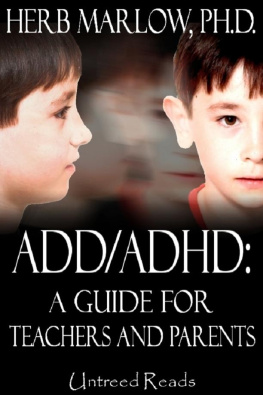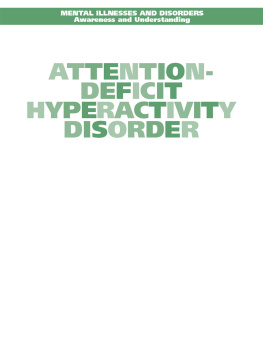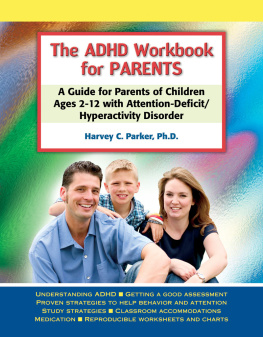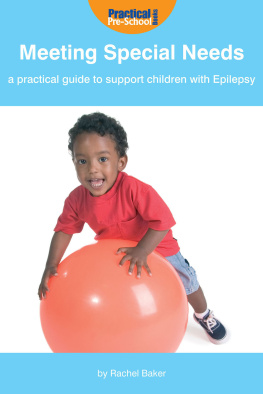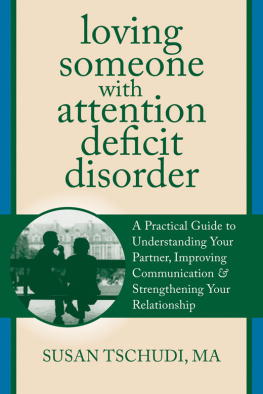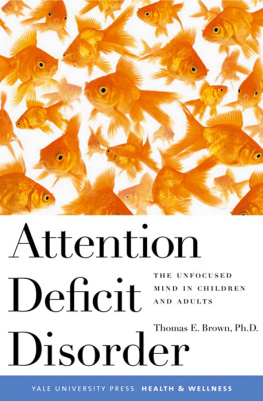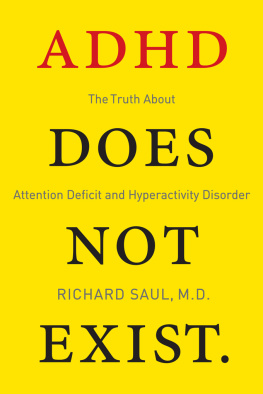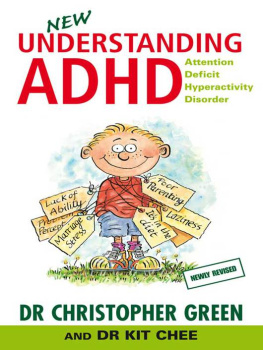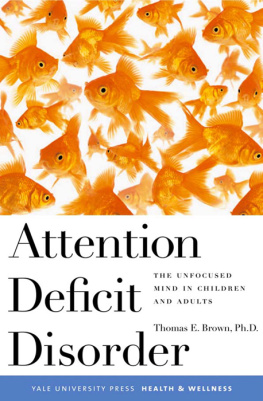ADD/ADHD: A Guide for Teachers & Parents
By Herb Marlow, Ph.D.
Copyright 2011 by Herb Marlow
Cover Copyright 2011 by Dara England and Untreed Reads Publishing
The author is hereby established as the sole holder of the copyright. Either the publisher (Untreed Reads) or author may enforce copyrights to the fullest extent.
This book is a practical guide for parents and teachers of children diagnosed with ATTENTION DEFICIT DISORDER and/or ATTENTION DEFICIT HYPERACTIVE DISORDER.
Parts of this book were published in a previous work by author Herb Marlow titled What Every Teacher and Parent Should Know About ADD & ADHD, published by Ozark Publishing, Inc.
This ebook is licensed for your personal enjoyment only. This ebook may not be resold, reproduced or transmitted by any means in any form or given away to other people without specific permission from the author and/or publisher. If you would like to share this book with another person, please purchase an additional copy for each person you share it with. If youre reading this book and did not purchase it, or it was not purchased for your use only, then please return to your ebook retailer and purchase your own copy. Thank you for respecting the hard work of this author.
http://www.untreedreads.com
ADD/ADHD:
A Guide for Teachers & Parents
By Herb Marlow, Ph.D.
Contents
This book is not written as a professional journalalthough counseling professionals will certainly appreciate the practical application of therapy techniques found in its pages. It is what it proclaims to be: a guidebook for parents and teachers who deal on an everyday basis with children who have been diagnosed with Attention Deficit Disorder (ADD) or Attention Deficit Hyperactive Disorder (ADHD).
We will not attempt to trace the history of the Attention Deficit Disorders, as that has been done in other, far more scholarly works. Rather, this book will address symptoms and solutions, ideas and results, situations and practical applications.
CHAPTER ONE
SCREENING SURVEY
Attention Deficit Disorder and Attention Deficit Hyperactive Disorder are becoming more and more prevalent in our children today. A lot of information is currently available to parents and teachers from many different sources, but sometimes it is difficult to sift through this mass of information, or to find the first step in testing to see if ADD or ADHD is the specific problem for a specific child.
As a former counselor and a person who likes children and wants to see them happy and fulfilled, this author feels that it is very necessary that parents and educators have tools available to them that are both easy to use and professional in content.
This survey has been written using the expertise gained by many years of counseling children and adults with ADD/ADHD problems. Not only has the author worked with families and educators as a counselor in private practice, he has also taught seminars and workshops on childhood problems in many settings. He has helped teachers and parents better understand ADD and ADHD, and how to cope with children suffering from these problems.
This screening survey is not intended as a formal test or a means of making a definitive diagnosis. It has been written as a guide for parents and educators to help them determine if the next step should be taken: visiting a professional to have formal testing done. The survey will help identify problems but offers no therapy procedures to correct those problems.
Following each symptom there is a short explanation of, or information on, what can be expected of an average child at the appropriate age level. As the survey is filled out, it should be noted that to be valid, the symptoms described must be present on a regular and consistent basis. Sporadically or occasionally fitting the symptom is not a strong enough criterion to justify a yes answer.
Permission is hereby given to reproduce this portion of the book for practical use. However, this permission is not extended for the remainder of the work. No other part of ADD/ADHD: A Guide for Teachers & Parents can be reproduced in any way without the express written permission of the author.
ADD/ADHD SCREENING SURVEY
Date:
__________________
Name:
____________________________________________
Directions: After reading the symptom, check the square if the characteristic has been observed on a regular and consistent basis. Keep in mind that occasional meeting of symptomatology is not enough to justify a check.
SECTION ONE
Attention Deficit Disorder Without Hyperactivity
1. Appears unable to understand directions or instructions.
It is not unusual for young children to fail to grasp complex directions or instructions, but all children should be able to understand simple, well-explained directions: i.e., Please pick up the pencil. If the child appears confused or unable to understand a simple direction on a regular basis, the box should be checked.
2. Does not pay close attention to details.
The ability to be detail-conscious grows as the child does. Age-appropriate children should be able to pay close attention to details and repeat those details in a sentence, picture or story.
3. Makes careless mistakes in schoolwork or homework.
Carelessness is a symptom of ADD only if it is consistent. All children turn in careless work from time to time, but children with ADD will make careless mistakes without realizing that they are being careless, and may actually be surprised when the carelessness is pointed out.
4. Has difficulty keeping attention focused on tasks or play activities.
Even though the child may display enthusiasm at the beginning of a task or play activity, that enthusiasm will flag much quicker than age-appropriate peers. This failure to focus will often bring on acting-out behavior or sadness.
5. Does not seem to listen when spoken to.
The child will appear to be totally inner-focused when spoken to and will not hear the spoken words. This is not an attempt to avoid hearing as all children will do from time to time; rather it is an actual auditory blanking of the words spoken.
6. Often has difficulty following through on instructions, resulting in failure to complete schoolwork or other tasks.
It may appear that the child has lost his/her place or has only heard part of the instructions. This is due to the lack of ability to focus attention on instructions heard or read. To check this box, the behavior must occur often and must not be a result of failure to understand the instructions given due to other learning problems.
7. Has difficulty organizing activities and tasks.
Organizing activities or tasks may often appear to be beyond the skill of the child. He/she will become confused and uncertain, even belligerent when directed to organize materials, tasks or activities.
8. Often may be unable to remember details and directions for starting classroom tasks or activities.
Details and directions will often become scattered and fragmented in the mind of the child with ADD, confusing short- and long-term memory. While a few details may be remembered, they will often be in the wrong order or partially distorted.
9. Locker, desk, notebook, dresser drawers, closet, etc., will often be messy and disorganized.
While this kind of messiness is not unusual in children, most will usually be able to organize spaces when it is demanded of them. In children with ADD problems, the messiness and disorganization is not usually by choice but because of the inability to order things in the mind.
10. Often loses items, i.e., homework, books, gloves, coats, shoes.
The child often appears to have no idea where the lost item was formerly placed, and cannot remember when he/she saw it last.

